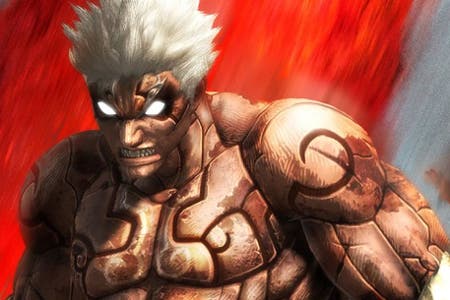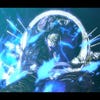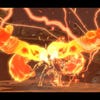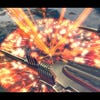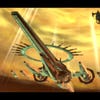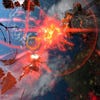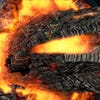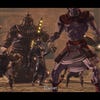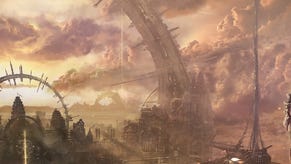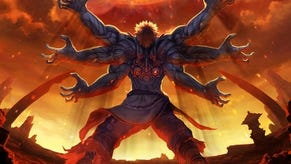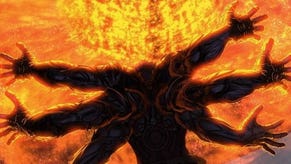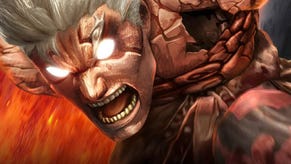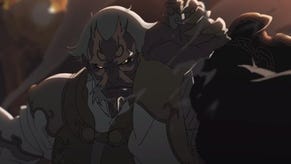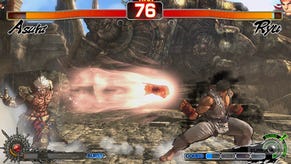Asura's Wrath Preview: Rage Against the Machine
More Heavy Rain than Bayonetta, Capcom's playable anime defies convention.
CyberConnect 2's central office is equal parts library and games development studio. Before you can get to the 140-strong workforce in the developer's Fukuoka base - supplemented by a further 70 staff working out of Tokyo - there's a lobby that houses over 3,000 DVDs and Blu-rays, the walls lined with a comprehensive collection of sci-fi and anime. Downstairs there are shelves upon shelves thick with manga, the stark strip-lighting and functional furniture giving the large open-plan meeting area the feel of a school reading room that's stacked with forbidden fruit.
It's more than mere decoration or pleasant distraction for CC2, a team that made its name first with the .hack series and then found greater success with Naruto before embarking on a brand new game, Asura's Wrath, in partnership with Capcom. All of these DVDs and all of these mangas are required reading for the team. Every single one of them.
"It's a general rule in our studio that all staff members should know all of the anime and manga that are on the shelves," CC2's president Hiroshi Matsuyama tells us with a smile, before his face hardens a little; "If they don't, and if they're not reading something or watching something, I get mad."
That dedication to popular culture - and specifically to the popular culture of Japan, rich as it is in surreal melodrama and impossible action - informs much of CC2's work. In the Naruto games (of which CC2 has produced 12 in just under a decade) the influence is explicit not only in the license but also in how it's handled. These are animes made interactive, told in bold and bright lines.
The influence is even more explicit in Asura's Wrath, where it's not only the art-style that's bold and bright. Asura's story is split into short, distinct episodes, each one trailered at the outset and ending with a dramatic cliffhanger. It shares its structure with traditional Japanese animation series, and it's got more in common with the animes stored throughout CC2's offices than it does with any game that's been released in recent years.
It's an approach that has already proved cause for concern, with a demo releasing last week to a generally negative response. "There have been a lot of mixed comments about the gameplay and how the story balances out against the gameplay," admits Matsuyara. "We think that's happened because people are comparing it to a lot of other games they've played before.
"We've seen a lot of comments that people want the game to be more like Bayonetta, for example. If you want to play a God of War type of game, play God of War, and if you want to play a Bayonetta type of game, play Bayonetta. I want people to play it and not have all these preconceptions. I want them to start from zero, from square one, and to take it for what it is and understand that it's a completely different experience focused on the story."
The story most definitely takes precedence in Asura's Wrath. Episodes tend to run to between 15 and 20 minutes in length, and once completed, the game's brave enough to tell you how much of that has been spent playing - typically, that figure comes in at under a quarter of an episode's total running time. If the gameplay takes a back seat in Asura's Wrath, then CC2 certainly isn't ashamed.
It will polarise opinion, though Capcom believes that's hardly an undesirable outcome. "We'd rather have people say that they really like it or that they really hate it," says Capcom's producer, Kazuhiro Tsuchiya. "Having that contrast is really important rather than a half-arsed reaction to the game, because that doesn't have any impact. If people say it's really good then others will go and play it, and when people say it's really bad others will want to see for themselves."
So what of the story - and are the sacrifices made with the gameplay worth it? Asura is one of a troop of gods engaged in battle with the Gohma, a mutated species that manifests itself in many different forms. He's soon betrayed by his fellow gods who take his daughter hostage, and so starts a plot that spans thousands of years, taking in scorched earth, barren moonscapes and mountain-top hot-tubs.
The story beats are, to be frank, typical of the high melodrama that defines much of the manga and anime that has inspired CyberConnect 2. But Asura's Wrath's greatest trick, possibly its crowning achievement, is how it makes it all come alive in the telling. Other games have presented us with the ridiculous, but few have made us really care about it.
Asura's Wrath has you thumping an oversized elephant to oblivion, has you taking to the skies with machine-gun wielding Buddhas by your side and then has you being crushed by a finger with an imprint the size of a continent - without ever coming up for air. It's hard not to be swept away by the cascading rush of it all.
The episodic approach pays dividends; the story is frequently recapped and further embellished in hand-drawn interludes, with each episode building to a dramatic crescendo before cruelly cutting away. With the 18 episodes told over three acts, each with a defined beginning, middle and end, it's an impeccably structured tale, and one that manages to be emotionally satisfying.
"If you want to play a God of War type of game, play God of War, and if you want to play a Bayonetta type of game, play Bayonetta. I want people to play it and not have all these preconceptions. I want them to start from zero, from square one, and to take it for what it is and understand that it's a completely different experience focused on the story." Hiroshi Matsuyama.
It's impeccably drawn, too. CC2 has already earned a reputation for making games with a certain beauty - its Naruto games, animated by hand and told with the visual dynamism of anime, remain unique, and Asura's Wrath builds upon those foundations. The world is darker while the lines are deeper, giving the impression that rather than being conjured from ink and paint, Asura's Wrath's world has been carved from wood.
This brooding artwork, all deep-set lines and tense muscles with a keen sense of improbable scale, sits well with a story that's thick with rage. Betrayed, bereaved and with increasingly improbable obstacles placed in his way, Asura is in constant fits of apoplexy - and it's up to the player to keep poking at Asura to keep that rage topped up.
The gameplay, when it rears its head, is predominantly a simple brawler. As with the rest of Asura's Wrath it's slight but taut, a handful of moves being used to string together combat that's more frenetic than graceful, with fists flying in fits of anger. Every successfully landed blow tops up an onscreen bar that, once full, sends Asura into a screen-shaking fury, kicking off a cut-scene fuelled by simple button presses that brings the set-piece to a screaming end.
A handful of on-rails shooter sections - as well as another more graceful character unlocked later on - shift the tempo, but the premise remains undiluted. This is a game about being angry, and with its input-heavy combat it's a game about playing angry, too.
It makes for a synchronicity of play and theme that's rare, and it's one that helps draw you into Asura's absurd and overstated world. But perhaps, in terms of its marriage of its subject and its mechanics, Asura's Wrath isn't so unique after all.
With the player taking a back seat to the story it has an unlikely soulmate in Heavy Rain - a comparison that Matsuyama is happy to invite. ("That's exactly what we want you to tell people. Write that in bold. 24 times - in the biggest font possible and in bold.") The unrelenting gloom of Quantic Dream's game may have been painted over with wide eyes and histrionics, but Asura's Wrath boasts a story that's equally compelling, and one that demands to be seen through to its end.
"Of course there's a big risk in a new IP in this day and age, especially with all the sequels and prequels around. We can't guarantee that people will accept our game - they may well hate it." Kazuhiro Tsuchiya.
And it's a shame to see Capcom taken to task for not offering another fantastical brawler and for trying something a little more novel. Asura's Wrath is an Actual New Game with a strange premise and an unmistakably Japanese twang, and not the kind of thing that you'd expect to see in a climate that's becoming increasingly risk-averse.
"Of course there's a big risk in a new IP in this day and age, especially with all the sequels and prequels around," recognizes Tsuchiya, before conceding; "We can't guarantee that people will accept our game - they may well hate it.
"Sequels are necessary in our industry, but it's also important to have new ideas so we can grow and progress. And that challenge of creating a new IP, it helps us grow as games creators as well. So that's what we're thinking - it's risky, but it's a challenge that we're excited about."
For anyone with a passing interest in popular Japanese culture or with a simple love of the absurd, it's worth taking note. Asura's Wrath is a marriage of manga, anime and games that's well intentioned, well informed and stupidly well read. For a game that's driven by rage and fuelled by anger, when the dust settles it's hard not to be utterly charmed by it all.
